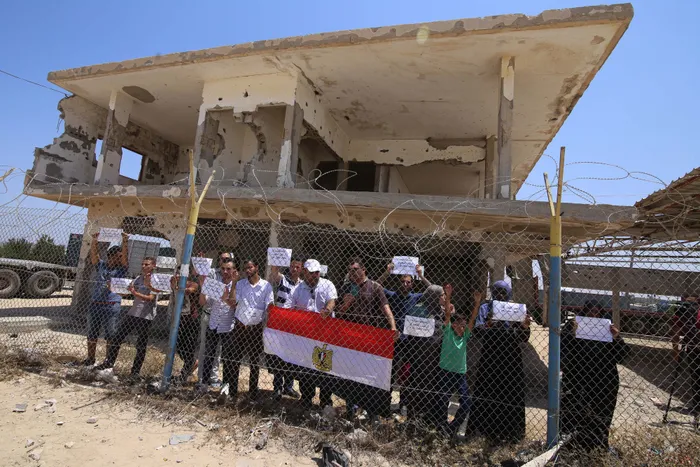Refugee crisis on Egypt’s border

Picture: Khaled Omar / Xinhua / Taken on July 3, 2017 – Palestinians gather at Rafah crossing point between southern Gaza Strip and Egypt. Egypt has said since the beginning of the war that it will not accept Palestinian refugees out of fear Israel will not allow Gazans to return after the war, However, as Israel drives thousands of Palestinians toward Egypt, pressure is building that may ultimately force Cairo to accept displaced Gazans – threatening the decades-long peace between Israel and Egypt, the writer says.
By The Washington Post and AFP
As the Israeli army continued its bombardment on scores of targets in the Gaza Strip this week, diplomats pressed on with efforts to halt the fighting with Hamas in the Palestinian territory.
Since the beginning of the war in Gaza, Egypt has held firm that it will not accept Palestinian refugees.
But as Israel presses on with its offensive in southern Gaza, driving thousands of Palestinians toward Egypt, pressure is building along the border. Conditions are ripe for miscalculation, former Arab diplomats and analysts say, and the war may ultimately force Cairo to accept displaced Gazans – threatening the decades-long peace between Israel and Egypt.
Since Israel launched its retaliatory war in Gaza after the Hamas attacks of October 7, nearly 20,000 Palestinians have been killed and more than 50,000 wounded, according to Gaza’s Health Ministry.
Whole swathes of the enclave are in ruins. The UN estimates 85 percent of its 2.2 million people have been displaced, heeding Israeli directives to flee to safer ground but often finding themselves on another battlefield.
A US intelligence assessment has found that almost half of the muni¬tions Israel has used in Gaza since the war began have been unguided bombs, a ratio that some arms experts say helps explain the conflict’s enormous civilian death toll.
The Israel Defence Forces (IDF) has fired more than 29,000 air-to-ground munitions into the Palestinian enclave since October 7, and only 55 percent to 60 percent of them have been precision-guided, according to a recent assessment from the Office of the Director of National Intelligence. The rest were what are known as “dumb bombs”, said two people familiar with the assessment who spoke on the condition of anonymity to discuss the matter.
The use of so many unguided bombs, first reported by CNN, is a concern among humanitarian groups and others amid growing calls inside and outside the US for Washington to condition any further military aid to Israel on the immediate reduction of civilian deaths.
Many Gazans are sheltering in the southern-most city of Rafah, along the border with Egypt, where they are packed into homes, schools and tent encampments. Others sleep on the streets. Disease is spreading. Aid is far from sufficient to meet the overwhelming needs of civilians, and Israeli bombing has hampered its delivery.
As the country reinforces its border in northern Sinai, top Egyptian envoys are doubling down on efforts to avoid such a scenario and push for a cease-fire. Egypt has offered safe haven to millions of people who fled recent conflicts in Sudan, Libya, Yemen and Syria. But the mass dislocation of Palestinians during Israel’s founding in 1948 – known here as the Nakba, or “catastrophe” in Arabic – still looms large in the regional psyche.
Arab governments fear that Israel will not allow Palestinians who leave Gaza to return after the war.
With public sentiment in Egypt squarely behind the Palestinian cause, top officials here have made clear since October that Cairo will not abet another mass displacement. Egypt has facilitated the exit of thousands of foreign nationals and Palestinians affiliated with foreign entities via the Rafah border crossing. But those who make it through are not allowed to stay in Egypt for more than a few days.
Cairo is also concerned about security, worried that Hamas militants will slip into northern Sinai.
“We reject the displacement of Palestinians from their land,” Egyptian President Abdel Fatah el-Sisi said a few months ago, warning that moving Gazans to Sinai would mean “transferring the attacks against Israel to Egyptian territory, which threatens the peace between Israel and a country of 105 million people”.
But conditions on the ground in Gaza have deteriorated substantially after more than two months of war.
A border breach would not be unprecedented. In 2008, thousands of Palestinians rushed into Egypt temporarily after Hamas militants blasted a hole in the border wall.
But if Palestinians do rush the border, “at the end of the day, you can’t leave people to die”, a former Arab diplomat said, speaking on the condition of anonymity to discuss sensitive deliberations.
In that event, the former diplomat said, Egypt would likely seek assurances from the US and Israel that any displacement of Palestinians would be temporary.
In the meantime, Egypt has constructed a concrete wall and earthen berms along its side of the border, according to video footage published last Saturday by the Sinai Foundation for Human Rights, a UK-based monitoring group with a team in northern Sinai. The military has also beefed up its presence. – The Washington Post and AFP